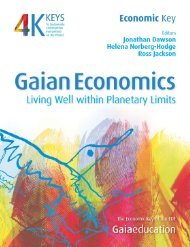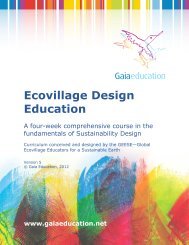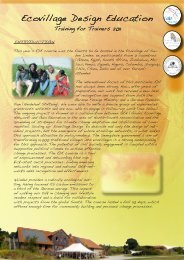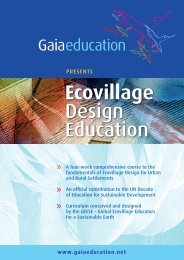Designing Ecological Habitats - Gaia Education
Designing Ecological Habitats - Gaia Education
Designing Ecological Habitats - Gaia Education
You also want an ePaper? Increase the reach of your titles
YUMPU automatically turns print PDFs into web optimized ePapers that Google loves.
46 <strong>Designing</strong> ecological <strong>Habitats</strong><br />
Science at Schumacher College tried to make sense of the significance of<br />
the attack on the World Trade Centre. It summarizes, in a simplified form,<br />
an important aspect of inner resilience at the individual and collective level.<br />
The extent to which we are able to respond to change with transformative<br />
resilience depends on whether we choose to act out of love (for life in all its<br />
manifestations) or out of fear.<br />
References<br />
Hodgson, T. (ed.) 2010 “Transformative Resilience – A Response to the Adaptive Imperative”, Report<br />
of a workshop on community resilience held in Scotland in December 2009, International Futures<br />
Forum<br />
Holling, C. S. 1973 “Resilience and stability of ecological systems”. Annual Review of Ecology and<br />
Systematics 4:1–23.<br />
Hopkins, R. 2009 “Resilience Thinking”, Resurgence, No. 257, November/December 2009, pp.12-15<br />
Huitric, M. (Ed.) 2009 “Biodiversity, Ecosystem Services and Resilience – Governance for a Future<br />
with Global Changes.” Background report for the scientific workshop in Tjärnö, Sweden, [online]<br />
http://lowres.stockholmresilience.org/download/18.235c0ace124479a1f73800013572/Tjarno_<br />
report_final.pdf<br />
Rockström, Johan 2010 “Let the environment guide our development”. TED presentation, [online]<br />
http://www.ted.com/talks/johan_rockstrom_let_the_environment_guide_our_development.html<br />
Rockström, J., et al. 2009 “Planetary Boundaries: Exploring the Safe Operating Space for Humanity,”<br />
Ecology and Society. 14(2): 32 [online] URL: http://www.ecologyandsociety.org/vol14/iss2/art32/<br />
Wahl, D. C. 2007 “Scale-linking Design for Systemic Health: Sustainable Communities and Cities in<br />
Context”. International Journal of Ecodynamics, Vol.2 No.1, pp.57-72<br />
Daniel Christian Wahl has more than 12 years of experience in sustainability education and<br />
consultancy (e.g. for the UK government and UNITAR/CIFAL Findhorn). Originally trained as<br />
a biologist (University of Edinburgh, 1996), he also holds an MSc in Holistic Science<br />
(Schumacher College, 2002) and a PhD in Natural Design (University of Dundee, 2006).<br />
Daniel was the director of Findhorn College between 2007 and 2010 (see Findhorn College).<br />
He now works independently with organizations like the Bioneers (www.bioneers.org),<br />
<strong>Gaia</strong> <strong>Education</strong> (www.gaiaeducation.org), the CLEAR VILLAGE Foundation (www.clear-village.<br />
org), and the Open University of Catalunya (UOC). He lives at Son Rullan on Mallorca<br />
(www.sonrullan.es) and is working on new methods to facilitate and mentor nature-based<br />
experiences of deep insight, reconnection, and transformation (www.creativesustainability.eu).<br />
Daniel writes freelance on sustainability issues (www.ecohabitar.org).







